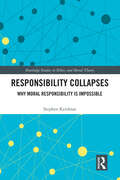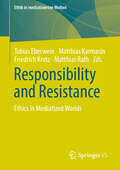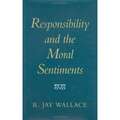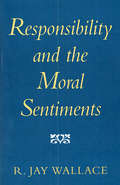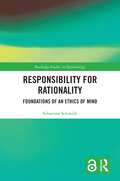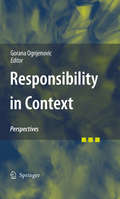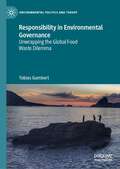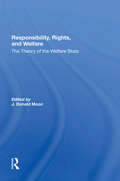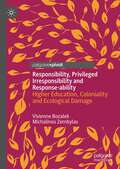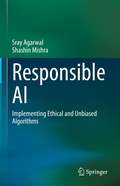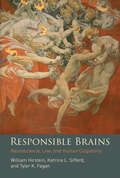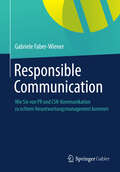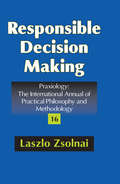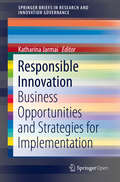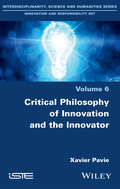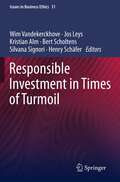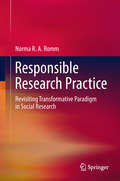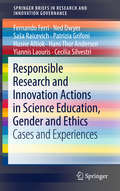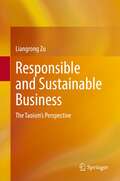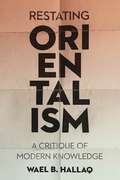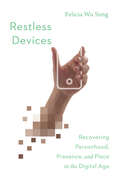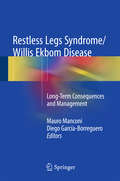- Table View
- List View
Responsibility Collapses: Why Moral Responsibility is Impossible (Routledge Studies in Ethics and Moral Theory)
by Stephen KershnarOur worldview assumes that people are morally responsible. Our emotions, beliefs, and values assume that a person is responsible for what she thinks and does, and that this is a good thing. This book argues that this worldview is false. It provides four arguments for this conclusion that build on the free will and responsibility literatures in original and insightful ways: 1. Foundation: No one is responsible because there is no foundation for responsibility. A foundation for responsibility is something for which a person is responsible but not by being responsible for something else. 2. Epistemic Condition: No one is responsible because no one fulfills the epistemic condition necessary for blameworthiness. 3. Internalism: If a person were responsible, then she would be responsible for, and only for, what goes on in her head. Most of the evidence for responsibility says the opposite. 4. Amount: No one is responsible because we cannot make sense of what makes a person more or less praiseworthy (or blameworthy). There is no other book that argues against moral responsibility based on foundationalism, the epistemic condition, and internalism and shows that these arguments cohere. The book’s arguments for internalism and quantifying responsibility are new to the literature. Ultimately, the book’s conclusions undermine our commonsense view of the world and the most common philosophical understanding of God, morality, and relationships. Responsibility Collapses: Why Moral Responsibility Is Impossible is essential reading for scholars and advanced students in philosophy, religious studies, and political science who are interested in debates about agency, free will, and moral responsibility.
Responsibility and Judgment
by Hannah ArendtBest known as the author of The Origins of Totalitarianism, philosopher Hannah Arendt (1906-1975) spent much of her academic and writing career wrestling with questions of morality. This volume presents unpublished writings from the last decade of Arendt's life examining the nature of evil and moral choice and the connection between judgment and responsibility. Kohn provides background information on Arendt's life and ideas in the introduction. Annotation 2004 Book News, Inc., Portland, OR (booknews.com)
Responsibility and Resistance: Ethics in Mediatized Worlds (Ethik in mediatisierten Welten)
by Matthias Rath Matthias Karmasin Friedrich Krotz Tobias EberweinThe volume deals with the normative challenges and the ethical questions imposed by, and through, the developments and changes in everyday life, culture and society in the context of media change. It is thus concerned with the questions of whether and how the central concept of (enlightened) ethics must evolve under these premises – or in other words: what form do ethics take in mediatized societies? In order to address this question and to stimulate and initiate a debate, the authors focus on two concepts: responsibility and resistance. Their contributions try to shed light not only on the empirical shreds of evidence of change in mediatized societies, but also on the normative challenges and ethical possibilities of these developments.
Responsibility and the Moral Sentiments
by R. Jay WallaceWe need to understand what we are doing when we hold people morally responsible, a stance that Wallace connects with a central class of moral sentiments, those of resentment, indignation and guilt. To hold someone responsible, he argues, is to be subject to these reactive emotions in one's dealings with that person. Developing this theme, he offers an interpretation of the reactive emotions and traces their role in our practices of blame and moral sanction.
Responsibility and the Moral Sentiments
by R. Jay WallaceR. Jay Wallace advances a powerful and sustained argument against the common view that accountability requires freedom of will. Instead, he maintains, the fairness of holding people responsible depends on their rational competence: the power to grasp moral reasons and to control their behavior accordingly. He shows how these forms of rational competence are compatible with determinism. At the same time, giving serious consideration to incompatibilist concerns, Wallace develops a compelling diagnosis of the common assumption that freedom is necessary for responsibility.
Responsibility for Rationality: Foundations of an Ethics of Mind (Routledge Studies in Epistemology)
by Sebastian SchmidtThis book develops the foundations of an ethics of mind by investigating the responsibility that is presupposed by the requirements of rationality that govern our attitudes. It thereby connects the most recent research on responsibility and rationality in a unifying dialectic.How can we be responsible for our attitudes if we cannot normally choose what we believe, desire, feel, and intend? This problem has received much attention during the last decades, both in epistemology and ethics. Yet, its connections to discussions about reasons and rationality have been largely overlooked. The book has five main goals. First, it reinterprets the problem of responsibility for attitudes as a problem about the normativity of rationality. Second, it connects substantive and structural rationality by drawing on debates about responsibility. Third, it supports recent accounts of the normativity of rationality by explicitly defending the view that epistemic reasons and other ‘right‑kind’ reasons are genuine normative reasons, and it does so by drawing on recent discussions about epistemic blame. Fourth, it breaks the stalemate between rationalist and voluntarist accounts of mental responsibility by proposing a hybrid view. Finally, it argues that being irrational can warrant moral blame, thus revealing an unnoticed normative force of rational requirements.Responsibility for Rationality is an original and essential resource for scholars and advanced students interested in connecting strands of normative theory within epistemology, metaethics, and moral psychology.The Open Access version of this book was published with the support of the Swiss National Science Foundation.
Responsibility in Context
by Gorana OgnjenovicThis path breaking volume raises a number of necessary questions related to various aspects of responsibility for others through its multidisciplinary approach. Unlike its predecessors it takes a starting point in various empirical contexts and consequently draws conclusions from there on. The importance of the topic is reflected by absolute domination of neo-liberalism: facing a dismantling of the welfare state, privatization and the spread of "privatist" mentality in the era of individualization. The economic rationality sets the values that we are expected to live up to, reincarnating yet again the classical Frankfurt School diagnosis: politics are determined by economy. The importance of the method is reflected by taking real life situations as a starting point. In doing so, the method also challenges the current trend science generally where concepts are kidnapped from their native contexts, and recycled: re-used in contexts unnatural to them, where the only reality that matters is the one determined by the scientists' ability to define it. This volume rejects the neo-liberal paradigm of 'responsibility' as the only valid interpretation of reality. Therefore academics, undergraduate and graduate students, as well as general readers will find this volume thought provoking. "...the commitment to situating questions of responsibility in social contexts - this is something that is neglected in philosophy and only recently coming to the fore in sociology." Keith Tester, co-author of Bauman Before Postmodernity: Invitation, Conversations and Annotated Bibliography 1953-1989, author of The Social Thought of Zygmunt Bauman (2004), Conversations with Zygmunt Bauman (2001). "This project is an original and valuable contribution to discussion of these important issues,... a good text for graduate and senior undergraduate texts in political theory, political philosophy, moral philosophy, and social and political thought." Lorraine Code, author of Ecological Thinking, The Politics of Epistemic Location (2006); Encyclopaedia Of Feminist Theories (2000); Feminist Interpretations Of Hans-Georg Gadamer (2003).
Responsibility in Environmental Governance: Unwrapping the Global Food Waste Dilemma (Environmental Politics and Theory)
by Tobias GumbertThis book provides a comprehensive study of the notion of responsibility in environmental governance. It starts with the observation that, although the rhetoric of responsibility is indeed all-pervasive in environmental and sustainability-related fields, decisive political action is still lacking. Governance architectures increasingly strive to hold different stakeholders responsible by installing accountability and transparency mechanisms to manage environmental problems, yet the structural background conditions affecting these issues continue to generate unevenly distributed, socially unjust, and ecologically devastating consequences. Responsibility in Environmental Governance develops the concept of responsibility as an analytical approach to map and understand these dynamics and to situate diverse meanings of responsibility within larger socio-political contexts. It applies this approach to the study of food waste governance, uncovering a narrow governance focus on accountability, optimization, and consumer behavior change strategies, opening up spaces for organizing more democratic solutions to a truly global problem.
Responsibility, Rights, And Welfare: The Theory Of The Welfare State
by J Donald Moon J. Donald MoonThis book explores the social, historical, and philosophical bases of the welfare state. It examines the ways in which the welfare state gives expression to the deepest impulses and values of our way of life as it deals with the issues of poverty and social dislocation.
Responsibility, privileged irresponsibility and response-ability: Higher Education, Coloniality and Ecological Damage (Palgrave Critical University Studies)
by Michalinos Zembylas Vivienne BozalekThis book uses the overlapping approaches of political care ethics and feminist posthumanism as a lens to focus on the notions of privileged irresponsibility, responsibility and response-ability within the context of higher education and as it pertains to the issues of colonialism/decolonisation, pandemics and the climate crisis. The book will appeal to scholars in the field of higher education as well as to those in several other fields, such as ecology, gender studies, sociology, philosophy, and political science.
Responsible AI: Implementing Ethical and Unbiased Algorithms
by Sray Agarwal Shashin MishraThis book is written for software product teams that use AI to add intelligent models to their products or are planning to use it. As AI adoption grows, it is becoming important that all AI driven products can demonstrate they are not introducing any bias to the AI-based decisions they are making, as well as reducing any pre-existing bias or discrimination. The responsibility to ensure that the AI models are ethical and make responsible decisions does not lie with the data scientists alone. The product owners and the business analysts are as important in ensuring bias-free AI as the data scientists on the team. This book addresses the part that these roles play in building a fair, explainable and accountable model, along with ensuring model and data privacy. Each chapter covers the fundamentals for the topic and then goes deep into the subject matter – providing the details that enable the business analysts and the data scientists to implement these fundamentals. AI research is one of the most active and growing areas of computer science and statistics. This book includes an overview of the many techniques that draw from the research or are created by combining different research outputs. Some of the techniques from relevant and popular libraries are covered, but deliberately not drawn very heavily from as they are already well documented, and new research is likely to replace some of it.
Responsible Brains: Neuroscience, Law, and Human Culpability
by William Hirstein Katrina L. Sifferd Tyler K. FaganAn examination of the relationship between the brain and culpability that offers a comprehensive neuroscientific theory of human responsibility. When we praise, blame, punish, or reward people for their actions, we are holding them responsible for what they have done. Common sense tells us that what makes human beings responsible has to do with their minds and, in particular, the relationship between their minds and their actions. Yet the empirical connection is not necessarily obvious. The “guilty mind” is a core concept of criminal law, but if a defendant on trial for murder were found to have serious brain damage, which brain parts or processes would have to be damaged for him to be considered not responsible, or less responsible, for the crime? What mental illnesses would justify legal pleas of insanity? In Responsible Brains, philosophers William Hirstein, Katrina Sifferd, and Tyler Fagan examine recent developments in neuroscience that point to neural mechanisms of responsibility. Drawing on this research, they argue that evidence from neuroscience and cognitive science can illuminate and inform the nature of responsibility and agency. They go on to offer a novel and comprehensive neuroscientific theory of human responsibility. The authors' core hypothesis is that responsibility is grounded in the brain's prefrontal executive processes, which enable us to make plans, shift attention, inhibit actions, and more. The authors develop the executive theory of responsibility and discuss its implications for criminal law. Their theory neatly bridges the folk-psychological concepts of the law and neuroscientific findings.
Responsible Communication: Wie Sie von PR und CSR-Kommunikation zu echtem Verantwortungsmanagement kommen
by Gabriele Faber-WienerIn Zeiten von Finanzkrise, wachsender Vernetzung, Wertewandel und einer Gesellschaft, die Unternehmen, Politik und Institutionen immer mehr hinterfragt, gewinnt Transparenz zunehmend an Bedeutung. Speziell dort, wo Corporate Social Responsibility (CSR) zum integralen Bestandteil des Wirtschaftens herangewachsen ist, wird mehr denn je klar: Viele herkömmliche, gelernte Rezepte greifen nicht mehr, um Glaubwürdigkeit, Vertrauen und Legitimation in der Öffentlichkeit zu bewahren. Offenheit und Flexibilität im Management sind gefragt - und eine neue Qualität in der Kommunikation. Kommunikation ist ein Spiegel der Haltung. Unternehmen und Institutionen, die Nachhaltigkeit und Verantwortung in ihrem Wertekatalog verankert haben, müssen sich bewusst sein, dass diese proklamierten Werte verstärkt hinterfragt und auf ihre Glaubwürdigkeit abgeklopft werden. Verantwortliches Management verlangt nach einer wertebasierten, zukunftsfähigen und diskursorientierten Kommunikation. Dies ist Kern dieses Buches. Es setzt sich mit den Voraussetzungen für glaubwürdige Kommunikation zusammen, untersucht die Praxis der PR und CSR-Kommunikation auf ihre Glaubwürdigkeit hin und entwickelt ein neues Konzept, das die Verantwortung der Kommunikatoren ausdehnt: weg von einer zumeist eindimensionalen Positiv-Kommunikation, hin zum offenen und selbstkritischen Diskurs. Responsible Communication heißt: Sie handeln und kommunizieren: ausgewogen - selbstkritisch - ethik-basiert - dialogisch Nur dann ist Glaubwürdigkeit gewährleistet - frei nach der Devise "Verantwortung heißt Antwort geben"
Responsible Decision Making (Praxiology Ser.)
by Laszlo ZsolnaiWhat should I do?, How should I deal with this?, How should I behave?, How should I act? we ask ourselves daily. But, this is only the first part of the sentence, while the full sentence is What should I do ... to achieve such and such?, for example to complete an assigned task, to do well before my boss or a client, to be pleased with myself, to carry out my plans, to make money in the stock market, to pass an exam, to complete an application, etc. These and similar questions that people ask, consciously or not, openly or not, are decisions.What skills must we master, especially when there is a need to make not only elementary decisions, but also decisions that affect the existence, health, and even lives of people? First, Laszlo Zsolnai writes that we should acquire the skill of gaining knowledge. Only then will we stand a chance of reacting to things that are improbable today, but could become a fact tomorrow. Also essential is the skill of designing, i.e., preparing actions conceptually in order to make decisions before irreversible changes occur. Finally, it is essential to master the skill of multidimensional judgment within the space defined by effectiveness, efficiency, and ethics.This is Zsolnai's attempt to build a model of making ethical decisions both effectively and efficiently. Therefore, the model is much broader than purely an analytical framework would be. It must tell us how to act rather than limit us to reflection on actions already performed; it must combine decision and praxiological analysis of human conduct. The proposed model enlarges the scope of the debate and suggests new avenues of both rational and responsible decision making. This is an original statement of the crossover of policy and morality.
Responsible Innovation: Business Opportunities and Strategies for Implementation (SpringerBriefs in Research and Innovation Governance)
by Katharina JarmaiThis Open Access book, Responsible innovation provides benefits for society, for instance more sustainable products, more engagement with consumers and less anxiety about emerging technologies. As a governance tool it is mostly driven by research funders, including the European Commission, under the term “responsible research and innovation” (RRI). To achieve uptake in private industry is a challenge. This book provides successful case studies for the implementation of responsible innovation in businesses. The importance of social innovations is emphasized as a link between benefits for society and profits for businesses, especially SMEs. For corporate industry it is shown how responsible innovation can offer a competitive advantage to adopters. The book is based on the latest insights from theory and practice and combines conceptual work with first-hand experience. It is of interest to innovation managers, entrepreneurs and academics. For academics, the book will provide a combination of analysis and discussion, and present recent learnings from first-hand interaction with entrepreneurs. For innovation managers and entrepreneurs, it will provide inspiration and better ideas about what responsible innovation can look like in practice, why others have “done it” and what the potential benefits might be. The book will thus serve the purposes of spreading the word about the responsible innovation concept among different audiences whilst making it more accessible to innovation managers and entrepreneurs.
Responsible Innovation: Philosophy as a Way of Life to Understand
by Xavier PavieThe major innovations which have occurred between the end of the 20th and the beginning of the 21st century represent a fresh challenge to the responsibility of innovators. Innovators have disrupted, and continue to disrupt the world through the growth of technology, DNA sequencing, genetic engineering, the management of large databases, different forms of intrusion into our private lives, etc. It is up to them take full responsibility for their actions, and question what they are accomplishing, why they are accomplishing it, to what end and with what means. Such questionings are those found in a practice conducted by Ancient philosophers: spiritual exercises. These were internal or external discourses, enabling individuals to act, think, to know how to behave and how to master oneself. It is surely toward these practices innovators of today should turn in order to innovate with wisdom.
Responsible Investment in Times of Turmoil
by Wim Vandekerckhove Henry Schäfer Silvana Signori Bert Scholtens Jos Leys Kristian AlmThe SRI phenomenon is said to be entering the mainstream of financial intermediation. From a fairly marginal practice promoted or campaigned for by NGO's and at odds with financial practice and orthodoxy it grew into well formulated policy adopted by a wide range of investors. Academic literature on SRI has also boomed on the assumption that mainstreaming is taking place. However, little thinking has been carried out on questions specifically arising from this alleged 'mainstreaming'. This book, addressed to those with a scholarly or practitioner's interest in SRI, starts filling this neglected dimension. Today, one cannot ignore the difficulties of main stream financing. The financial spheres are trembling globally in one of the worst crises since the 1930's. As a response to the crisis, the intermediation of 'financial responsibility' will undoubtedly be the subject of new regulation and scrutinizing. This book looks into what these turbulences will imply for SRI. In view of these circumstances, one might or even should, ask oneself whether the phenomenon was not an empty fad during the exuberant high of financial euphoria that came abruptly to an end with current financial crises. To put it rather sec: are financial intermediaries that promote 'sustainability' credible, while it is obvious that some developments in financial intermediation -predictably, as some say- were unsustainable? Is this an opportunity for enhancing SRI because of the strength and superiority it has developed or will it disappear due to a return to financial myopia? This book is the first to question the future of SRI in such a radical way.
Responsible Research Practice
by Norma Ra RommThis book explores ways in which creative research practice can be explicitly and mindfully geared to make a difference to the quality of social and ecological existence. It offers a range of examples of how different research methods can be employed (and re-tuned) with this intention. The book suggests that what Romm names "active" research involves using the research space responsibly to open up new avenues for thinking and acting on the part of those involved in the inquiry and wider stakeholders. The book includes a discussion of a range of epistemological, ontological, methodological and axiological positions (or paradigms) that can be embraced by inquirers implicitly or explicitly. It details the contours of an epistemology where knowing is recognized to be grounded in social relations, as a matter of ethics. While focusing on discussing the “transformative paradigm” and attendant view of research ethics, it considers to what extent the borders between paradigms can be treated as being permeable in creative and active inquiries. Apart from considering options for enhancing responsible research practice during the process of inquiry (and reconsidering mixed-research designs) the book also considers options for responsible theorizing that is inspirational for pursuing goals of social and ecological justice.
Responsible Research and Innovation Actions in Science Education, Gender and Ethics: Cases and Experiences (SpringerBriefs in Research and Innovation Governance)
by Hans Thor Andersen Fernando Ferri Ned Dwyer Saša Raicevich Patrizia Grifoni Husne Altiok Yiannis Laouris Cecilia SilvestriThis book gathers case studies presented at the International Conference on Responsible Research and Innovation in Science, Innovation and Society (RRI-SIS2017). It highlights European initiatives and projects in various domains and contexts, each of which explores how to create guidelines and good practices for Responsible Research and Innovation and how to promote them among citizens, industry stakeholders, policy and decision makers, research funders and educational institutions to foster their adoption as a potential benchmark in establishing RRI processes. Further, the book discusses gender and ethical issues, which are highly relevant for RRI initiatives in connection with representativeness, risks and in some cases, minority rights.
Responsible and Sustainable Business: The Taoism's Perspective
by Liangrong ZuThis book claims that CSR is the Tao of sustainable enterprise development. It examines the intersection of practical wisdom of Taoism, CSR and Sustainability, looking at the theoretical and historical implications associated with a Taoist approach to CSR, sustainability and responsible leadership. Implications for sustainable enterprise development will be presented. The book analyzes perspectives found in Taoist classical texts and within the larger Chinese cultural context in order to delineate key issues found in the classical texts. Through these analyses, the book assesses the applicability of modern-day Taoism thought and practice in China and the West with respect to the contemporary sustainability situation. The book also explores the values, ideas and practices Taoism offers to inspire a new generation of leaders, and particularly business leaders to manage companies in a more social and sustainable way.
Restating Orientalism: A Critique of Modern Knowledge
by Wael HallaqSince Edward Said’s foundational work, Orientalism has been singled out for critique as the quintessential example of Western intellectuals’ collaboration with oppression. Controversies over the imbrications of knowledge and power and the complicity of Orientalism in the larger project of colonialism have been waged among generations of scholars. But has Orientalism come to stand in for all of the sins of European modernity, at the cost of neglecting the complicity of the rest of the academic disciplines?In this landmark theoretical investigation, Wael B. Hallaq reevaluates and deepens the critique of Orientalism in order to deploy it for rethinking the foundations of the modern project. Refusing to isolate or scapegoat Orientalism, Restating Orientalism extends the critique to other fields, from law, philosophy, and scientific inquiry to core ideas of academic thought such as sovereignty and the self. Hallaq traces their involvement in colonialism, mass annihilation, and systematic destruction of the natural world, interrogating and historicizing the set of causes that permitted modernity to wed knowledge to power. Restating Orientalism offers a bold rethinking of the theory of the author, the concept of sovereignty, and the place of the secular Western self in the modern project, reopening the problem of power and knowledge to an ethical critique and ultimately theorizing an exit from modernity’s predicaments. A remarkably ambitious attempt to overturn the foundations of a wide range of academic disciplines while also drawing on the best they have to offer, Restating Orientalism exposes the depth of academia’s lethal complicity in modern forms of capitalism, colonialism, and hegemonic power.
Restless Devices: Recovering Personhood, Presence, and Place in the Digital Age
by Felicia Wu SongWhat kind of people are we becoming with personal technologies in hand?And who do we really want to be?
Restless Legs Syndrome/Willis Ekbom Disease
by Mauro Manconi Diego García-BorregueroDue to the fact that Restless Legs Syndrome/Willis-Ekbom Disease is usually a chronic condition, this book aims to provide physicians with the necessary tools for the long-term management of patients with RLS. The first part of the book addresses the various comorbidities and long-term consequences of RLS on life quality, sleep, cognitive, psychiatric and cardiovascular systems, while the second part focuses on the management of long-term treatment and the drug-induced complications in primary RLS and in special populations. Written by experts in the field, this practical resource offers a high-quality, long-term management of RLS for neurologists, sleep clinicians, pulmonologists and other healthcare professionals.
Restless Reason and Other Variations on Kantian Themes (Philosophical Studies Series #147)
by Amihud GileadThis book, combining integratively-revised previously-published papers with entirely new chapters, challenges and treats some major problems in Kant’s philosophy not by means of new interpretations but by suggesting some variations on Kantian themes. Such variations are, in fact, reconstructions made according to Kantian ideas and principles and yet cannot be extracted as such directly from his writings. The book also analyses Kant's philosophy from a new metaphysical angle, based on the original metaphysics of the author, called panenmentalism. It reconstructs some missing links in Kant's philosophy, such as the idea of teleological time, which is vital for Kant's moral theory. Although these variations cannot be found literally in Kant’s works, they can be legitimately explicated, developed, and implied from them. Such is the case because these variations are strictly compatible with the details of the texts and the texts as wholes, and because they are systematically integrated. Their coherence supports their validation. The target audiences are graduate and PhD students as well as specialist researchers of Kant's philosophy.
Restoration of the Republic: The Jeffersonian Ideal in 21st Century America
by Gary HartInvestigates the relationship between rights and responsibilities.
